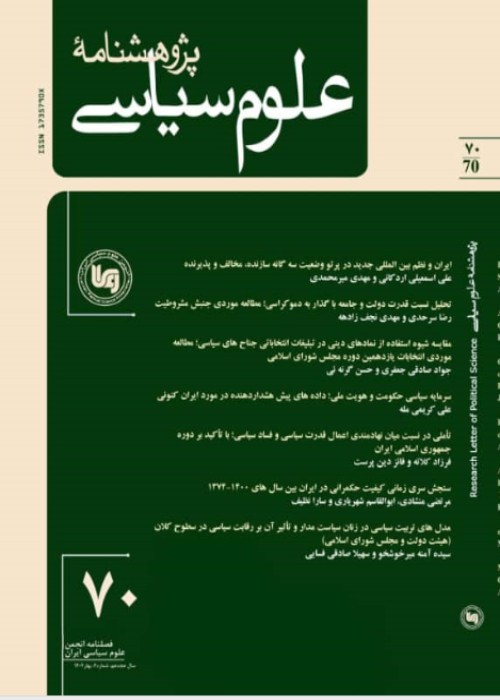The Ethics of Hostility in Political Thought of Islam
Author(s):
Abstract:
Human history is punctuated with sweet and bitter experiences, and hostility, violence, and bloodshed are among the most prominent bitter experiences. “Ethics” and ethical principles are major rules which may somehow control such atrocities and the wrath which underlies them. All religions, in general, and Islam, in particular, have promoted ethics and it has been stipulated that Prophet Mohammad (S) has been assigned to prophethood in order to complete the best ethical principles. The main question of this article is, “what ethical rules and principles have been determined by Islam in the situation of political hostility for different parties, specifically Muslims?” Islam, here, means a collection of Quran, Sunna and the practices of Imam Ali (AS). Hostility has been discussed here in two general levels of politics. First, is the internal level or the domestic politics and second, is the external level or the international politics. Hostility in internal level means hostility in a country among political parties or groups or between parties and groups, on one side, and incumbent politicians and statesmen, on the other side, and among the statesmen governing various sections of the state or the collection of all the above mentioned. By the external level of hostility we mean hostility among independent political entities or between these entities on one side and international organizations, on the other side. Hostility is categorized into two classes of “cold hostility” and “violent hostility” in any one of the above-mentioned levels. In cold hostility, there is no bloody conflict and dispute involving the use of firearms and physical violence while it happens in violent hostility. “Dissidents” are, naturally different from “enemies” and they are not alike. This paper focuses on the ethics of hostility. Every discussion here also includes dissent and dissidents and they have been differentiated from animosity and enemies.
Keywords:
Language:
Persian
Published:
Journal of Political science Association, Volume:5 Issue: 4, 2010
Page:
69
https://magiran.com/p936547
دانلود و مطالعه متن این مقاله با یکی از روشهای زیر امکان پذیر است:
اشتراک شخصی
با عضویت و پرداخت آنلاین حق اشتراک یکساله به مبلغ 1,390,000ريال میتوانید 70 عنوان مطلب دانلود کنید!
اشتراک سازمانی
به کتابخانه دانشگاه یا محل کار خود پیشنهاد کنید تا اشتراک سازمانی این پایگاه را برای دسترسی نامحدود همه کاربران به متن مطالب تهیه نمایند!
توجه!
- حق عضویت دریافتی صرف حمایت از نشریات عضو و نگهداری، تکمیل و توسعه مگیران میشود.
- پرداخت حق اشتراک و دانلود مقالات اجازه بازنشر آن در سایر رسانههای چاپی و دیجیتال را به کاربر نمیدهد.
In order to view content subscription is required
Personal subscription
Subscribe magiran.com for 70 € euros via PayPal and download 70 articles during a year.
Organization subscription
Please contact us to subscribe your university or library for unlimited access!



